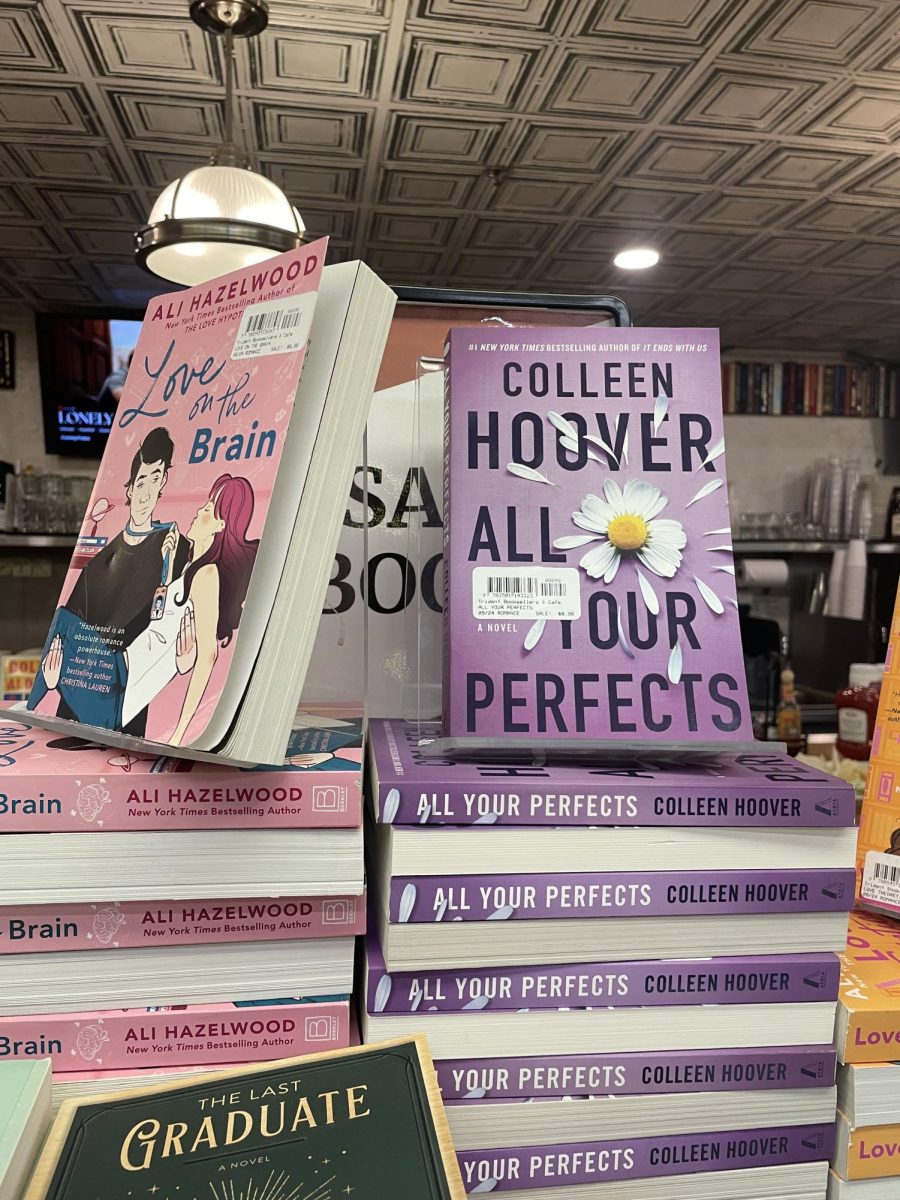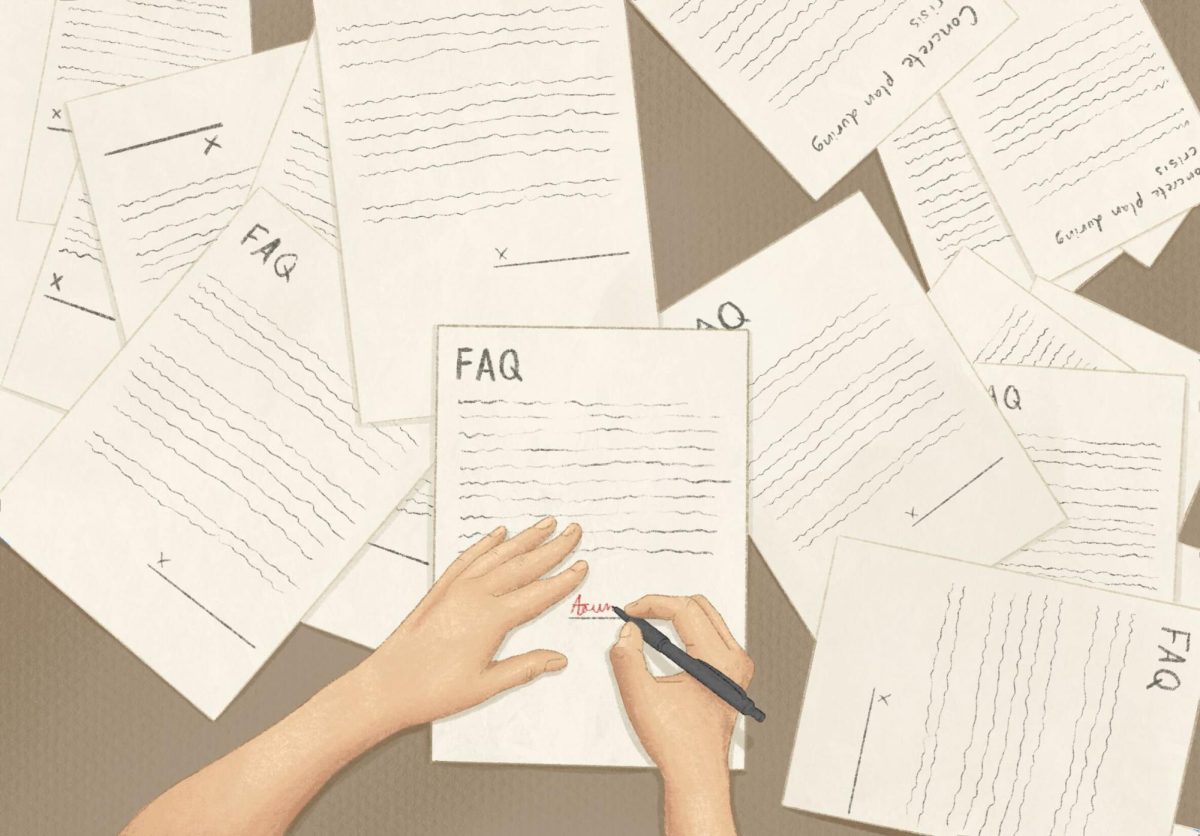Note: This article contains mentions of content that may be disturbing to some readers, including toxic relationships, domestic violence and sexual assault.
“Ellen, I am confident that the next sentence I am about to write has never been written or spoken before. When he was wiping that cow shit on me, it was quite possibly the most turned on I have ever been,” Colleen Hoover wrote in her 2016 novel “It Ends With Us.”
If you’ve ever been anxious about sharing your written work with the world, just remember “It Ends With Us” outsold the Bible by 2.3 million copies in 2022 and even got a movie adaptation in 2024. And BookTok, the side of social media platform TikTok that focuses on, well, books, is absolutely loving it. But beyond a slew of poor-quality writing, what’s the issue?
Throughout her 12-year writing career, Hoover has a history of promoting toxic and abusive relationships in her books. There should be a clear difference between sharing a story about abuse, condemning it in the process, and portraying a story about abuse as good.
Hoover decides to go with the latter. “It Ends With Us,” Hoover’s most-known work, romanticizes and excuses domestic violence, evident in the relationship between the main characters. Similarly, her book “November 9” presents sexual assault scenes as desirable, which downplays how serious the issue actually is.
The female characters she writes are rarely dynamic, enduring inexcusable abuse, physical or emotional, that they tend to let slide. The male characters are given chance after chance and still fail to deliver, often excusing their poor actions by claiming “past trauma.” Hoover’s books are often rooted in sexist stereotypes, with the female protagonist’s life entirely changed by a random man.
The novels are also superficial, have no comprehensible plot and fall short of expectations in almost every category. The fun, colorful book covers make them look like harmless young adult novels. If mistakenly given to a teenager or even a tween, these erotic books can cause a lot more damage than they already do. Don’t buy your little cousin these books; we’re often warned not to judge a book by its cover, but in this case, it’s for the best.
There is no denying that Hoover’s popularity skyrocketed due to the way BookTok has promoted these kinds of books, and this promotion is problematic from start to finish. BookTok is oversaturated with smut and addictive book trends that function like fast fashion: similar plots, similar book covers, similar writing styles. As more of these books get churned out, people are buying more and more books that they don’t actually read.
In a frantic race to check every book off the reading list, reading gets turned into a competition, with some users showcasing their extreme reading counts. Reading should be quality over quantity, not the other way around. Unfortunately, TikTok has reduced it to a mere aesthetic, just another trend, characterized by pretty Pinterest photo boards and carefully picked, yet usually still basic (and frequently misinterpreted), quotes.
Many are motivated to read not because they want to, but because the internet says they should, which leads me to my next point: “performative readers.” They don’t read because they like to — they read to be better than you, and it shows. They carry their books everywhere they go, log what they read on Goodreads and announce it to the world, often expecting some sort of reward. They compare their unrealistically high reading counts to others. They want to create the image of being well-read without actually putting in the work necessary to develop those skills.
Then there are the “elitist readers,” who often also fall into the “performative reader” category. They act like they know more about literature than anyone else, failing to realize that they don’t look as intelligent as they think they do — they just look elitist and classist. They brush off modern literature, refusing to read anything beyond “real literature” or the “classics.” By refusing to accept modern literature as valid, these readers are missing out on so many wonderful pieces of work, many of which will be considered classics to future generations.
Elitist writers often take their favorite authors and frame their entire personality around them, describing themselves as “written by Dostoevesky” or some other author. They shape their entire life around the academic aesthetic, but these aesthetics take time and money that many simply don’t have. The expensive clothes, the fancy pens and the piles of books — none of them are free, and not everyone has the time or energy to spend all their free time reading.
These elitist readers will look down on readers who don’t dive into the same aesthetic, not realizing the privilege they have for being able to shape their lives around such an aesthetic, a privilege only given to those who can afford it, which typically means the upper class.
In the end, though, I’m glad people are still reading. I wish technology hadn’t muted the artistry of it, turning what’s supposed to be a relaxing, slow process into a rush to consume as much as possible. I want to read because I’m intrigued by a book, not because I set a goal to read 20 books this year.
I want to engage with a book in my own way, and I encourage you to do the same. Find a book that speaks to you, one you want to read because it looks interesting. Find literature that you like. Value and uplift the voices of lesser-known authors. Be aware of exaggerations and romanticizations of serious issues that are far more severe than some authors present them. Don’t view yourself as better than anyone else because you read more often or fall into a higher-level reading category.
Take a deep breath, pick up your book and enjoy. Take as long as you need. After all, reading is an art, and art takes time.
Antaine Anhalt is a first-year communication studies major. He can be reached at anhalt.a@northeastern.edu
The Huntington News is dedicated to serving the Northeastern University community with original, professional reporting and creating an environment in which student journalists can learn from one another. Support an independent, free press at Northeastern University with your donation today.


















